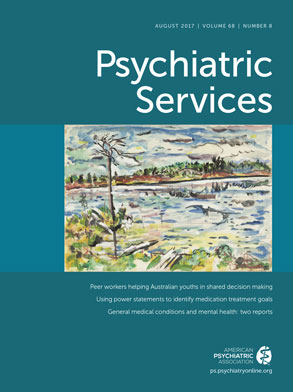TO THE EDITOR: Individuals discharged from inpatient psychiatric facilities (IPFs) require timely follow-up care to maintain their functioning and avoid or delay future hospitalizations (
1,
2). Despite the importance of follow-up care, there is surprisingly little national data to describe whether individuals discharged from IPFs receive timely services in the community.
We used calendar year 2008 Medicare fee-for-service (FFS) claims data that included 50 states and the District of Columbia to measure the receipt of follow-up care within seven and 30 days of IPF discharge. We implemented the specifications for the Follow-up After Hospitalization for Mental Illness measure that health plans report for the Healthcare Effectiveness and Information Data Set (HEDIS) (
3). Follow-up care was defined as a visit with a psychiatrist, psychologist, psychiatric nurse, or social worker. We calculated facility-level follow-up rates and then aggregated rates by state and region. Medicare enrollees who were also enrolled in Medicaid or Medicare Special Needs Plans were excluded because we did not have their complete data. A data use agreement with the Centers for Medicare and Medicaid Services (CMS) governed data security.
We identified 61,871 FFS Medicare discharges with a principal mental health diagnosis from 1,669 IPFs (both freestanding facilities and hospital psychiatric units). On average, 28.7% of discharges received follow-up care within seven days and 53.5% within 30 days across all facilities and states. Average facility-level 30-day follow-up rates ranged from 35.7% to 73.7% across states. [A table showing state-level follow-up rates is available as an online supplement.] On average, 30-day IPF follow-up rates were lower in southern and western states (49.1% and 46.2%, respectively) relative to eastern and midwestern states (59.0% and 58.6%, respectively).
Compared with Medicare health maintenance organizations (HMOs) that reported this measure to HEDIS in 2008, the average seven-day follow-up rate for the Medicare FFS population included in this study was 10 points lower (38.1% versus 28.7%, respectively), whereas the 30-day follow-up rates were similar (56.5% among Medicare HMOs versus 53.5% in this study) (
4). It is possible that HMOs use care management strategies that result in a higher proportion of their enrollees’ receiving timely follow-up care relative to the Medicare FFS population.
We report these findings to stimulate quality improvement efforts and further research. In the future, CMS plans to report facility-level follow-up rates for IPFs via the Inpatient Psychiatric Facility Quality Reporting program. These findings serve as a benchmark from which to measure progress. Given that our findings are based on claims, we cannot fully explain the source of variation in follow-up care. Some variation could be attributable to differences across states or regions in the availability of providers who accept Medicare or wait times for those providers. Follow-up rates may reflect broader investments in community mental health services; it is notable that per capita state spending on community mental health services was lower in many southern and western states relative to midwestern and eastern states during the study period (
5). These findings provide a foundation for policymakers and researchers to investigate these possible sources of variation and identify strategies to improve the receipt of follow-up care.

